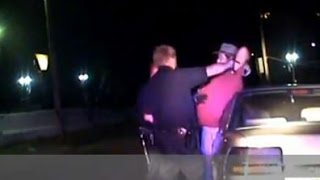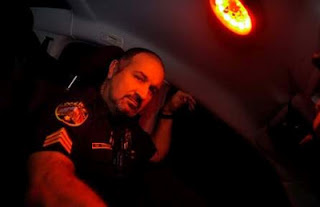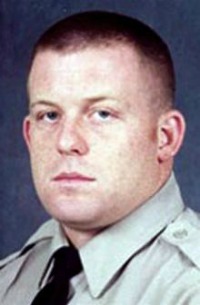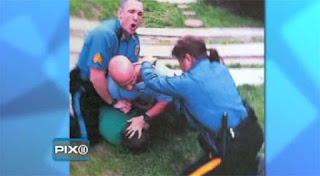| Robert Pierson, shortly before being illegally detained by Deputy Corry Bassett. |
“It’s just about being safe.”
Thus spoke Deputy Corry Bassett of the Lincoln County,
Wyoming Sheriff’s Office as he
struggled to justify handcuffing Robert Pierson during an August 11, 2011
traffic stop.
Pierson, a Marine combat veteran, had been riding his motorcycle
near Alpine when another motorist called to complain about a biker passing a
number of slow-moving motor homes. Pierson was not charged with a traffic
violation or a criminal offense -- but he was arrested and detained in
handcuffs for 45 minutes because the sight of a Mundane carrying a firearm
caused Bassett to irrigate his underwear.
“I know you have a gun,” Bassett said a few seconds into the
stop, which was recorded
on Pierson’s cell phone. “Are you a cop?”
When Pierson indicated that he was not part of the armed
revenue-extracting caste, Bassett muttered: “OK, what I’m going to do is – put your
hands behind your back right now.”
As he handcuffed the compliant motorist, Bassett explained, “I
don’t like someone with a gun,” while insisting, “You’re not under arrest.”
The second statement is an unalloyed lie: Whenever a police
officer restrains someone, that person is under arrest. The first statement is
a lie by omission: If Pierson had been a police officer, Bassett would not have
complained about him carrying a gun. The category of “someone” thus applies
only to Mundanes, whose very existence is seen as a threat to the unimaginably
precious personages who wear state-issued costumes.
“It’s the first thing you should have told me, [that] you’ve
got a gun,” simpered Bassett, whose panic-tinged voice was thrown into sharp
relief by Pierson’s composure.
“Well, actually I’m not required to tell you in either Idaho
or Wyoming,” Pierson correctly pointed out.
“Yes, you are,” insisted Bassett. “If you’re packing a gun,
I want to know about it.”
“Well, I’m open-carrying,” Pierson observed, stating the
obvious. As Bassett began a rote speech describing the sacred imperative of “officer
safety,” Pierson pointed out that he had done nothing wrong or illegal, that
the deputy’s safety “is not in any way in jeopardy," and that actually “it’s not
my concern.”
“It is!” yelped Bassett. “It’s my concern!”
“My only concern is my personal rights and individual
liberties, which you are violating right now,” noted Pierson.
“No, I am not,” Bassett lied.
“You have me handcuffed,” Pierson reminded the increasingly
petulant officer.
“I handcuffed you for [sic] number one, you did not tell me
you had a gun on you, ‘kay?” Bassett groused. “You do not get off your bike and
face me, and I see a weapon on you! I don’t like that!”
“You asked me if I could get off my bike, and you said `yes,’”
recounted Pierson.
“I
understand your concerns about search and seizure, but you have to understand
one thing about where we’re at in law enforcement,” stated Bassett. “I’m asking
you for my safety. I don’t know you. I don’t know your intentions.”
The same could have been said by Pierson about Bassett, who was, after all, just another armed stranger. One critical difference, of course, is that Pierson knew that Bassett’s intentions were malign: After all, the deputy had detained him, which is an act of aggression by any definition.
Recall
that when Bassett noted that Pierson had a gun, his first question was: “Are
you a cop?” If Pierson had been a fellow member of the Brotherhood of Official
Plunder, this would have allayed Bassett’s concerns.
In
fact, after noticing that Pierson carried a military ID, Bassett suggested that
the detainee should see the encounter in terms of “force security” in a battle
zone.
“You’re
in the military,” Bassett began. “You ever been shot at? Would you like, if you
roll up on somebody you have no idea who they are … wouldn’t it be a question
in your mind if this person’s got weapons on them?”
Bassett,
who never served in the military, clearly saw himself as part of an army of
occupation – and insisted on unqualified submission to his supposed authority.
“Your
safety does not trump my right and my liberty,” Pierson tutored the deputy.
“When
I stop you, yes it does,” asserted Bassett.
“Your
personal safety is more important than all the laws, the Constitution, and every one of my
personal rights and liberties,” summarized Pierson, his voice heavy with
disgusted incredulity.
“When
I’m in a traffic stop, yes,” declared Bassett. “I’m in control of this
situation.”
“The
Constitution is in control of this situation,” Pierson rejoined.
“No
– I am… and if I feel that I’m going to be threatened by the fact that you have
a gun on your side, by hell I’m gonna do it,” concluded Bassett.
Forty-five
minutes later, Deputy Rob Andazola arrived to provide “backup.” At that point, as
Bassett has admitted in a sworn deposition, the deputies offered to unshackle
Pierson if he allowed Andazola to draw his weapon and shoot the motorcyclist in the event he made any gesture perceived as a “threat.”
Pierson
didn’t agree to those terms. Eventually a patrol supervisor reached the scene
and acknowledged that the motorcyclist had done nothing wrong. Until that
happened, however, Pierson was handcuffed, disarmed, and entirely at the mercy
of two armed strangers who considered it their right – if not their duty – to kill
him if he displayed any behavior that made them uneasy.
“I
didn’t know whether kicking my leg over the bike, or walking away, or what they
could possibly constitute as a hostile act,” Pierson
told the Associated Press. “And I was a little unnerved by the fact that
they were threatening lethal force with a deadly weapon against a man who was
compliant, in handcuffs, who had been screened.”
In
the sacred cause of “officer safety,” no precaution is excessive, no imposition
unjustified – and no constitutional “guarantee” of individual rights is
binding.
Pierson’s
legitimate concern for citizen safety in the presence of police is underscored
by an incident that occurred near Canton, Ohio just weeks before the traffic
stop in Wyoming.
On
June 8, 2011, Patrolman Daniel Harless of the Canton, Ohio Police
Department, repeatedly threatened to murder the driver, William E.
Bartlett, for carrying a concealed handgun for which he had obtained the
appropriate permit.
At all times, Bartlett was composed and cooperative. He made every effort to comply with the Ohio concealed carry ordinance by notifying Harless that he was carrying a weapon, and displaying his concealed carry license. He was rewarded with a profane outburst in which Harless made it clear that he was eager for a chance to kill somebody.
At all times, Bartlett was composed and cooperative. He made every effort to comply with the Ohio concealed carry ordinance by notifying Harless that he was carrying a weapon, and displaying his concealed carry license. He was rewarded with a profane outburst in which Harless made it clear that he was eager for a chance to kill somebody.
“As soon as I felt
your gun I should have took [sic] two steps back, pulled my Glock 40 and just
put 10 bullets in your ass and let you drop,” ranted Harless. “And I wouldn’t
have lost any sleep.”
After threatening to
“put lumps on” a witness to the incident, Harless told Bartlett, “I’m so close
to caving in your f*****g head…. You’re just a stupid human being…. F*****g
talking to me with a f*****g gun. You want me to pull mine and stick it to your
head?”
Unlike Harless, who was obviously deranged, Bassett and
Andazola did not dissolve into puddles of psychotic rage. But lurking behind their
veneer of “professionalism” was a willingness to commit homicide simply because
the sight of a Mundane with a firearm made them feel kind of funny.
When contacted by Pro Libertate to comment on the case,
Captain John Steztenbach of the Lincoln County Sheriff’s Office explained that “Our
lawyer has told us that we are to say absolutely nothing about this case. I would
love nothing more that for the other side of the story to be told, and we’re
very frustrated that we can’t tell it, but it’s been made clear that until this
goes to court, we’re not to comment on any aspect of this case.”
Stetzenbach, a courteous and well-spoken Connecticut native,
explained that the gag order applies not only to the details of Pierson’s
arrest, but also to any discussion of the department’s instructions and
guidelines dealing with matters of “officer safety.” After describing how he
had come to the Rocky Mountain West to study at a gunsmith trade school in
Colorado, Stetzenbach proclaimed that both he and the department he serves are “very
pro-Second Amendment,” and promised that when the legal issues are settled he
will be very eager to “tell the whole story.”
| What about "citizen safety"? Deranged Fed threatens to murder acitizen over a protest sign. |
“It always amazes me how in situations like this, one side gets out very quickly, and it’s not ours; that’s really frustrating,” Stetzenbach complained.
In this case – as in other “situations” of its kind – the
officers have themselves to blame for the fact that the public hasn’t seen “their
side” of the story, since the dashcam recordings of the encounter have
mysteriously disappeared.
The victim documented the incident, and the chief assailant
has confirmed all of the victim’s key assertions. Res ipsa loquitir.
In his sworn deposition (as paraphrased by the AP), Bassett
admitted that he had been “trained to put his personal safety above the rights
of a citizen openly carrying a handgun.”
“We’re told every day, our safety is first,” Bassett pointed
out. “We’re here to come home every night.”
Remember that admission next time you’re told that the
police are here to protect and serve the public.
If you can spare a few bucks, please help me keep Pro Libertate on-line.
Thanks, and God bless!
Dum spiro, pugno!





